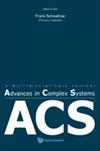Studies of COVID-19 Outbreak Control Using Agent-Based Modeling
IF 1
4区 数学
Q4 MATHEMATICS, INTERDISCIPLINARY APPLICATIONS
引用次数: 2
Abstract
An agent-based model was developed to study outbreaks and outbreak control for COVID-19, mainly in urban communities. Rules for people’s interactions and virus infectiousness were derived based on previous sociology studies and recently published data-driven analyses of COVID-19 epidemics. The calculated basic reproduction number of epidemics from the developed model coincided with reported values. There were three control measures considered in this paper: social distancing, self-quarantine and community quarantine. Each control measure was assessed individually at first. Later on, an artificial neural network was used to study the effects of different combinations of control measures. To help quantify the impacts of self-quarantine and community quarantine on outbreak control, both were scaled respectively. The results showed that self-quarantine was more effective than the others, but any individual control measure was ineffective in controlling outbreaks in urban communities. The results also showed that a high level of self-quarantine and general community quarantine, assisted with social distancing, would be recommended for outbreak control.基于agent建模的COVID-19疫情控制研究
建立了一个基于主体的模型来研究COVID-19的疫情和疫情控制,主要是在城市社区。人们的互动和病毒传染性的规则是基于之前的社会学研究和最近发表的关于COVID-19流行病的数据驱动分析得出的。根据所建立的模型计算出的流行病基本再现数与报告值相符。本文提出了保持社会距离、自我隔离和社区隔离三种控制措施。每项控制措施首先分别进行评估。随后,利用人工神经网络研究了不同控制措施组合的效果。为了帮助量化自我隔离和社区隔离对疫情控制的影响,分别对两者进行了缩放。结果表明,自我隔离的控制效果较好,但任何一种单独的控制措施对控制城市社区的疫情都是无效的。结果还表明,建议采取高水平的自我隔离和一般社区隔离,并辅以社会距离,以控制疫情。
本文章由计算机程序翻译,如有差异,请以英文原文为准。
求助全文
约1分钟内获得全文
求助全文
来源期刊

Advances in Complex Systems
综合性期刊-数学跨学科应用
CiteScore
1.40
自引率
0.00%
发文量
121
审稿时长
6-12 weeks
期刊介绍:
Advances in Complex Systems aims to provide a unique medium of communication for multidisciplinary approaches, either empirical or theoretical, to the study of complex systems. The latter are seen as systems comprised of multiple interacting components, or agents. Nonlinear feedback processes, stochastic influences, specific conditions for the supply of energy, matter, or information may lead to the emergence of new system qualities on the macroscopic scale that cannot be reduced to the dynamics of the agents. Quantitative approaches to the dynamics of complex systems have to consider a broad range of concepts, from analytical tools, statistical methods and computer simulations to distributed problem solving, learning and adaptation. This is an interdisciplinary enterprise.
 求助内容:
求助内容: 应助结果提醒方式:
应助结果提醒方式:


